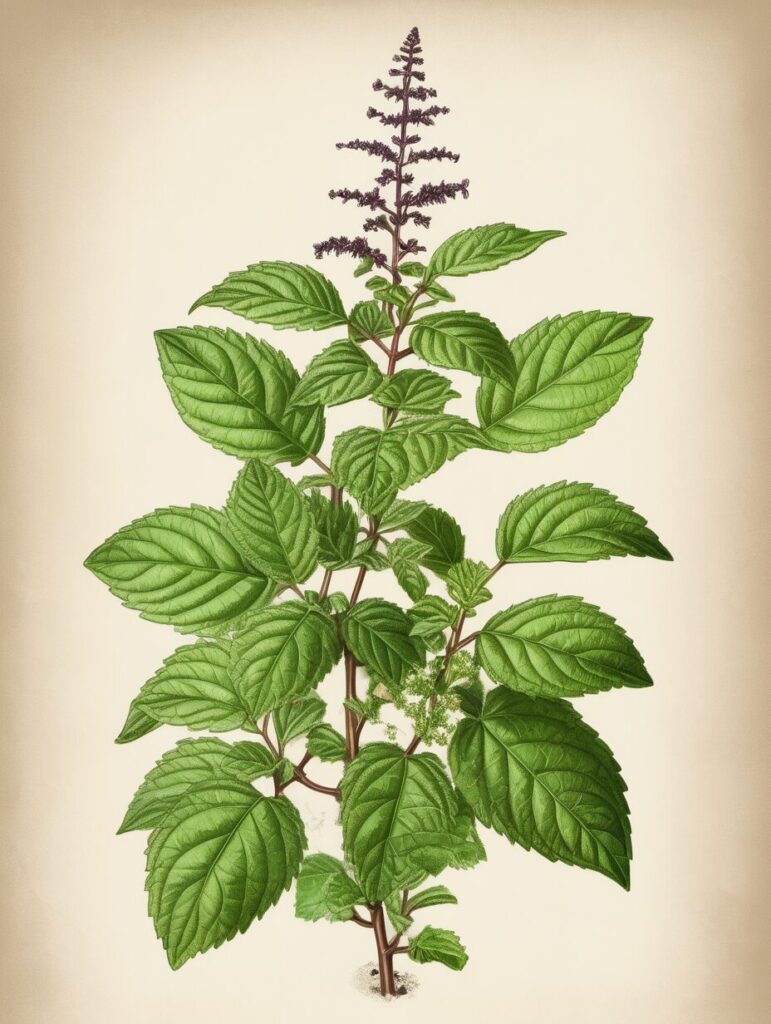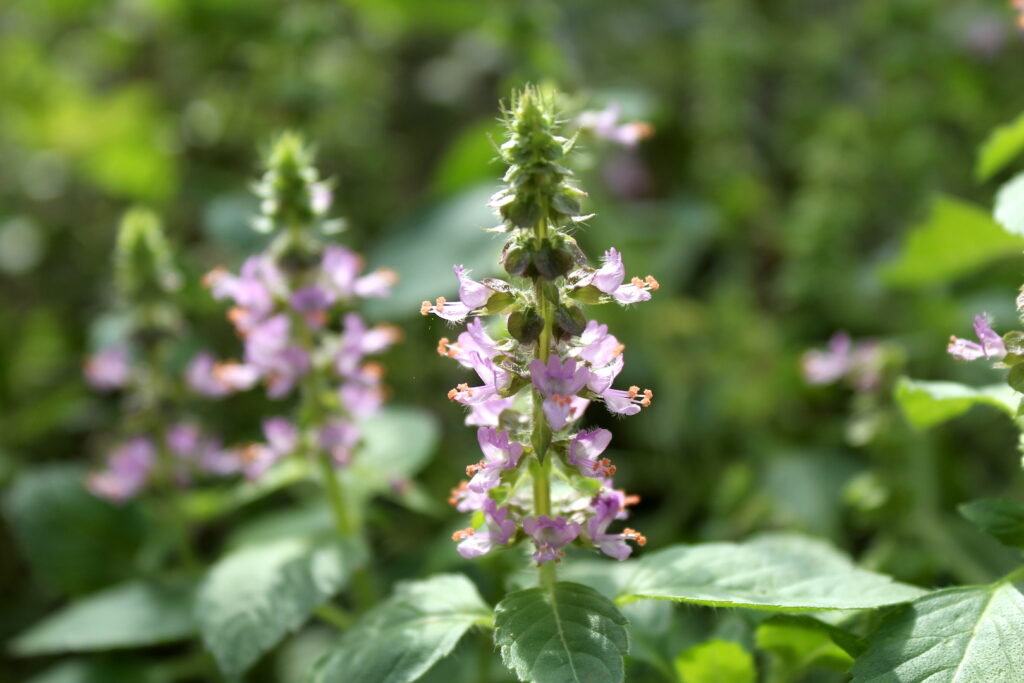More Than Just Another Basil
Growing up, basil has always been that reliable companion in my garden. Her aroma and flavor have filled my kitchen with bursts of joy, a familiar presence that makes every dish sing. I can’t think of cooking without her, whether it’s tossing her leaves into a salad or blending her into sauces. Often she reseeds herself for me so once established, I let her choose her location as she sees fit. Basil has illuminated each meal, reminding me of the joy found in nurturing something from seed to plate. But as I’ve immersed myself in the world of herbs over the years, I encountered another remarkable member of the basil family that deserves attention: Tulsi, or Holy Basil.



Tulsi, also known as Ocimum sanctum or Ocimum tenuiflorum, is often considered a sacred herb in Hindu culture. It’s woven into countless traditions and practices, and its story is as rich as the aromas it carries. Unlike the sweet basil I’m accustomed to, Tulsi has a scent that tells a different tale—one filled with spice, warmth, and depth. When you smell Tulsi for the first time, it’s like experiencing an entirely new dimension of basil. It lifts you up and grounds you all at once, with notes of clove and a hint of lemon, almost as if you’ve walked into a vibrant, herbal sanctuary.
If you’re thinking about growing Tulsi, you’ll find the process rewarding and fulfilling. Tulsi thrives in warm, sunny environments. It likes well-draining soil enriched with organic matter—just like her cousin basil. Start your seeds indoors a few weeks before the last frost; she’ll appreciate the head start. Once the threat of frost has passed and the earth has warmed up, you can transplant her outside. Water her consistently but be mindful not to drown her; Tulsi does best when the soil is kept moist but not overly wet.
When it comes time to harvest, you’ll soon recognize the delight in snipping off her leaves. The more you prune, the bushier she becomes, which means even more flavorful leaves for you to enjoy. I like to harvest in the morning, right after the dew dries but before the sun is too harsh. That’s when her essential oils are at their peak. You can enjoy Tulsi’s leaves fresh, dry them for later use, or prepare a soothing tea that warms both the soul and the body. Just steep a handful of leaves in hot water and let the plant’s healing properties work their magic.
Tulsi’s medicinal benefits are impressive. This isn’t just a plant sitting innocently in your garden; it has a lot to offer. Revered in Ayurvedic traditions for centuries, Tulsi is considered an adaptogen, which means it helps your body adapt to stress. Given today’s fast-paced lifestyle, many of us could use that extra layer of support. Tulsi works to regulate cortisol levels—what I like to call the “stress hormone”—so you can find some balance even in chaos.
Her leaves are packed with antioxidants, too. Eugenol and rosmarinic acid are among the compounds that give Tulsi its powerful anti-inflammatory and antioxidant qualities. Research has shown that these compounds can help support overall immune health, fight oxidative stress, and even enhance your body’s natural defenses. When I incorporate Tulsi into my routine, I feel more grounded and better equipped to handle the ups and downs of daily life.
How to Enjoy the Benefits of Tulsi
There are several ways to enjoy Tulsi and harness its health benefits:
- Tulsi Tea: A simple yet effective way to enjoy the benefits of Tulsi is by brewing a tea using fresh or dried leaves. Steep a teaspoon or two of Tulsi leaves in hot water for 5-10 minutes to create a soothing and therapeutic beverage. You can adjust the strength and steeping time according to your preference. Tulsi tea can be enjoyed hot or cold and can be customized with other herbs, spices, or sweeteners to suit your taste.
- Tulsi Tincture: For a more concentrated dose of Tulsi’s medicinal compounds, consider using a Tulsi tincture. Tinctures are liquid extracts made by soaking herbs in alcohol or glycerin, which extracts their active constituents. A Tulsi tincture can be taken daily for its adaptogenic and immune-boosting properties.
- Culinary Uses: While Tulsi’s flavor is more potent and complex than sweet basil, it can still be used in cooking, especially in Indian and Thai dishes. Add fresh or dried Tulsi leaves to soups, stews, stir-fries, and curries for their medicinal benefits and unique flavor. It pairs well with a variety of ingredients, including vegetables, legumes, grains, and meats. I love to add Tulsi to my morning smoothies for an extra boost of antioxidants and adaptogens.
- Aromatic Uses: You can also harness the therapeutic benefits of Tulsi through its aromatic properties. Using Tulsi essential oil in a diffuser can create a calming and uplifting atmosphere, promoting relaxation, mental clarity, and emotional well-being. The aroma of Tulsi can help reduce stress, ease anxiety, and improve focus. You can also add a few drops of Tulsi essential oil to a warm bath for a soothing and rejuvenating experience.
One of my favorite ways to enjoy this herb is by brewing Tulsi tea. There’s something incredibly soothing about sipping on warm herbal tea, especially when I know what it does for my body. Just grab a few fresh leaves, toss them in a cup, and pour boiling water over them. Let it steep for a few minutes, and you’ll have a fragrant elixir that’s as healing as it is delicious. Whether I’m recharging after a long day or starting my morning off right, a cup of Tulsi tea reminds me to take a moment for myself and reconnect with nature.
When it comes to culinary uses, Tulsi’s flavor is more intense than the sweet basil I’m used to, but that doesn’t mean it doesn’t have its place in the kitchen. Its assertive notes pair wonderfully with a variety of dishes, particularly in Indian and Southeast Asian cuisine. I often like to add it to soups, curries, and stir-fries, where its robust character can shine through. A little goes a long way, so experiment and find the balance that suits your palate.
If you’re creating a garden space, consider dedicating a spot to Tulsi. The act of nurturing her is a reminder of the unique relationship we have with plants. Just as I have learned to care for basil over the years, growing Tulsi inspires me to understand this new herb deeply—to listen to what she needs and to appreciate the gifts she offers. There’s an art to growing and using these herbs, an understanding that unfolds with each season.
Now, let’s talk about how differently Tulsi impacts you on an emotional level. I’ve often found that the scent of Tulsi lifts my spirits, perhaps because of its known effects on reducing anxiety and enhancing mood. The aroma from its leaves interacts with our olfactory receptors, triggering a cascade of responses in the brain’s limbic system—the very center of our emotions. It’s fascinating how something as simple as a plant can influence our emotional state and well-being.
When I think of Tulsi, I’m reminded of the stories and legends that surround her. In various cultures, placing a sprig of Tulsi under your pillow is said to bring about sweet dreams.
It’s said that if the leaves remain fresh by morning, your dreams will guide you toward a pure-hearted partner. These stories add a layer of magic to growing this herb, turning it into not only a wonderful addition to your garden but also a companion through the journeys of life.
Growing Tulsi isn’t just about tending to a plant; it’s about building a relationship. Every time I tend to her, I’m reminded of my responsibilities toward nurturing life—both in nature and within myself.
As I incorporate Tulsi into my daily routines, I’m grateful for the rich history and abundance of benefits this herb brings. From my first taste of sweet basil to the warmth of Tulsi tea warming my hands on a chilly day, each sensory experience connects me to the earth, the seasons, and the timeless dance of life.
Here’s to Tulsi, the Holy Basil that lifts our spirits, fortifies our health, and nurtures our souls. Let this sacred herb find a place in your garden and heart, as it teaches us to adapt, thrive, and embrace the balance life has to offer. Whether you’re sipping Tulsi tea, adding her to your favorite meals, or simply enjoying her aroma wafting through your home, may she be your gentle reminder to pause, breathe, and appreciate the little miracles that nature gifts us each day.



